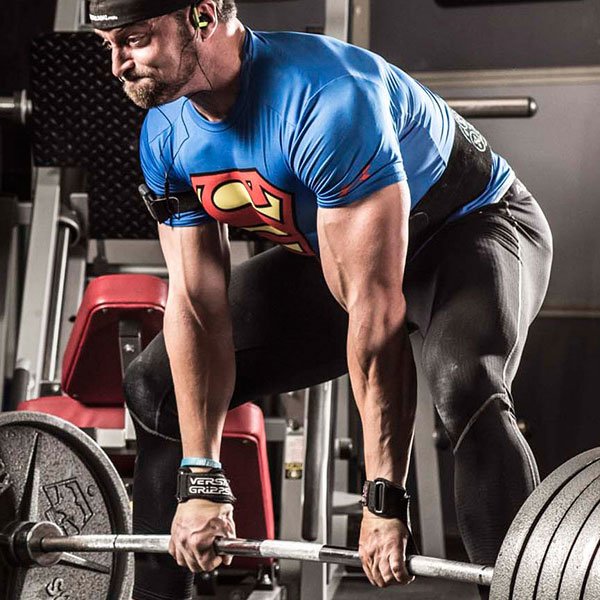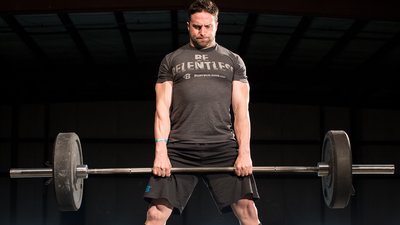Ask Layne Norton a question, and he'll give you the answer with as little sugar-coating as possible. This no-nonsense approach is what has helped him build up a sizable and loyal following among not just serious physique competitors, but also among hard-training Bodybuilding.com readers who just don't have time for BS.
When Norton stopped by our offices to record an episode of our Bodybuilding.com podcast recently, we crammed a lot of substance into an hour of conversation. Here's the complete video for you to consume when you want—if it fits your macros, of course—as well as some bite-sized morsels of wisdom to help you start 2017 strong!
How strict should I be during the holidays?
People ask me, "Should I track my macros during the holidays?" I'm like, "Well, it depends. If you don't want to, if you really just want to enjoy the time, there's nothing wrong with that. But if you go YOLO and you just eat whatever, don't be surprised when you've put on 10 pounds."
What you don't want to do is this: be completely mindless about it and say, "Well, I'd really like to stay lean, but I want to eat whatever I want." You don't get something for nothing.
If you say, "Well, I'd like to maintain most of my leanness, but I'd also like to back off a little bit on being so strict," and you have some cognitive restraint in there, that's fine. Again, it's a discussion. If you say, "You know what? What I value is being lean as hell, and I don't really care about having dinner. I'll go and be around my family, but I don't want to eat that food," then that's fine too. Your values don't have to extend to other people, and vice versa.
When I was younger, in my 20's, and bodybuilding was my entire life and consumed me, I would be trying to be really strict during the holidays. What would happen was when I was not able to be strict I would just YOLO and say, "Screw it," you know what I mean, and go into hell with it mode and eat whatever I wanted.
But I've found that if I allowed myself to relax a little bit, I actually became more adherent rather than less adherent, because I took those firm restraints off and it made it a little bit easier. A lot of people know that I'm a fan of flexible dieting. It's not because I want to eat candy and stuff all day. It's because it improves sustainability. It improves consistency. That's why I'm a fan of flexibility for most people.

Who is blood-flow restriction training best for?
If anything, BFR has been shown to be just as safe or more safe than regular weighlifting. However, you watch my video on BFR training on Bodybuilding.com to make sure you're doing it safely and correctly.
I don't think BFR is a magic tool, though. I think everything's just tools in the toolbox. I do a lot of BFR, especially when I'm getting ready for powerlifting meets, because I still want to maintain my arms and some of my aesthetics. But at the end of the day, I'm just so beat up from squatting, benching, and deadlifting heavy all the time that I don't feel like doing heavy barbell curls or triceps press-downs. I want to do something light that I can get through really quick, pump a lot of volume in a short period of time, and get out.
I think it's also for people who are injured. A lot of times, if you're injured, you can't do your normal training, but you can usually do 20 percent of a one-rep max.
It's also great for when you're traveling and you don't have many options. Well, now you can actually get a really good workout in. I've done this on cruise ships.
For my arms, I use what are called "quick-release medical tourniquets." You have to really crank them down, because the fabric is different, but you crank them down to about a 9-1/2 out of 10, and they're really convenient. You can find them online for like 12 bucks for a set of two. Yeah. I use it for is when I'm traveling, or when I'm injured, or I just don't feel like lifting heavy.

How should I spread protein intake throughout the day?
There's evidence that if you're going to focus on one [macronutrient], you probably should focus on protein. Because if you're eating enough protein, you're more satiated. You're probably not going to overeat as much on carbs and fats.
[In my recently-published study] we had one group eat whey evenly distributed across three meals, so they were getting the same amount of protein across each meal, or at least a level that would trigger muscle protein synthesis. The second group was getting about 70 percent of their protein at dinner and about 15 percent at breakfast and lunch. Actually, there's data that shows that most Americans eat about 65 percent of their protein at dinner. It wasn't too far outside that range.
So you're talking about the exact same calorie intake and nitrogen [protein] intake. The only difference is how we distribute it, and we were able to show a difference in muscle mass. It wasn't a huge difference. It was only about 8-10 percent more [in the evenly distributed group], but for somebody who's an elite athlete, that's a big difference.
How do I gain muscle on intermittent fasting?
When people ask me about something like intermittent fasting, I say I think it's fine for fat loss. The data shows that meal frequency doesn't make a difference in fat loss, but if you're talking about muscle mass, I think it's probably not optimal. But I've had people tell me, "Listen. I am able to be way more adherent to intermittent fasting than any other diet I've ever done. For whatever reason it just works for me." Then fine, do that.
What I'll suggest in that case is to intermittently restrict carbs and fats, because protein doesn't have the same effect. The effects that high-protein diets have on genes is very similar to actually just fasting, from my perspective. I say, "Well, why not have a couple doses of just protein, only have a shake or something. If your goal is to have more muscle mass, do that. Then, you can put your carbs and fats together in an intermittent-fasting way." There's no reason that shouldn't work well either.
On goals and injuries
I'm dealing with a few injuries, and people have said, "Oh. You see, your training volume was a bad idea." It wasn't a bad idea. I won Nationals twice, got a silver medal at Worlds, and set a Worlds squat record at the time. For me, it was worth it. Maybe for you it's not worth it.
Maybe you just care about being healthy and being able to play with your kids, and there's nothing wrong with that if that's your goal. But if your goal is to be the best you can possibly be at whatever sport it is, injuries are associated with that, but you also have to train a certain way. I knew that going in. I made a conscious decision.
I talk about that with a lot of my clients. Whatever the goals are, fat loss, muscle gain, all those sorts of things, there has to be a very defined discussion about what your expectations and your goals are. That shapes how everything else works.
Tip: Click Here To Subscribe To The Bodybuilding.com Podcast

